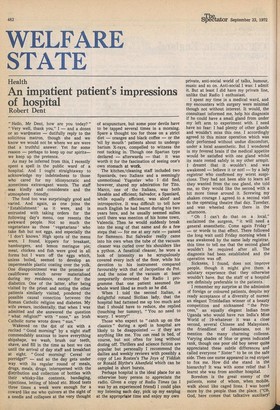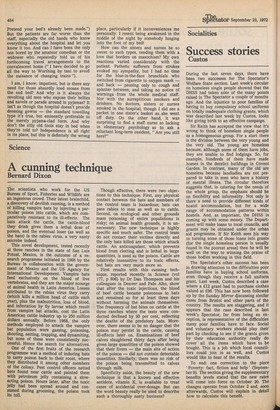Health
An impatient patient's impressions of hospital
Robert Dent
"Hello, Mr Dent, how are you today?" "Very well, thank you," I — and a dozen or so wardmates — dutifully reply to the solicitous matron, though she and we know we would not be where we are were that a truthful answer. Yet for some reason — perhaps to keep up our spirits— we keep up the pretence.
As may be inferred from this, I recently spent a spell in the public ward of a hospital. And I ought straightaway to acknowledge my indebtedness to those who cared for my idiosyncratic and sometimes extravagant wants. The staff was kindly and considerate and the atmosphere friendly.
The food too was surprisingly good and varied. And again, as one joins the ' Establishment ' as it were, and is entrusted with taking orders for the following day's menu, one resents the awkwai d people. Not so much the vegetarians as those 'vegetarians ' who take fish but not eggs, and especially the ' I don't knows.' High spots of the menu were, I found, kippers for breakast, hamburgers, and lemon meringue pie; meat, chicken and fish were good in all forms but I warn off the eggs which, unless boiled, seemed to develop an impermeable plastic coating over the yolk. One disappointment was the promise of cauliflower which never materialised during my residence, except for the diabetics. One of the latter, after being visited by the priest and noting the other patients similarly visited, pondered the possible causal conection between the Roman Catholic religion and diabetes. My wife swears, incidentally, that when I was admitted and she answered the question " what religion?" with " none," an Irish Catholic nurse wrote down "nun."
Wakened on the dot of six with a recited "Good morning" by a night staff commendably anxious to leave everything shipshape, we wash, brush our teeth, shave, and fill in the time as best we can until the arrival of day staff and breakfast at eight. "Good morning! Cereal or porridge?" — and so the day gets under way with its regular round of meals, drugs, meals, drugs, interspersed with the distribution and collection of bottles with their whisky-like contents, bandaging, injections, letting of blood etc. Blood tests three times a week were enough for a coward like me who quivers at the sight of a needle and collapses at the very thought of acupuncture, but some poor devils have to be tapped several times in a morning. Spare a thought too for those on a strict diet — oranges and black coffee — or the 'nil by mouth' patients about to undergo barium X-rays, compelled to witness the rest tucking in. Though one Spartan type declared — afterwards — that it was worth it for the fascination of seeing one's own stomach at work.
The kitchen/cleaning staff included two Spaniards, two Italians and a seemingly unemotional Yugoslav who I did find, however, shared my admiration for Tito. Marco, one of the Italians, was both likeable and efficient; Salvador, a Spaniard, while equally efficient, was aloof and introspective. It was difficult to tell how much English he had learnt during his two years here, and he usually seemed sullen until there was mention of his home town, Valencia. Then he would suddenly break into the song of that name and do a few steps that — for me at any rate — passed for flamenco. But Salvador really came into his own when the tube of the vacuum cleaner was curled over his shoulders like a python. A fanatical cleaner, he wore a look of intensity as he scrupulously covered every inch of the floor, while his devotion to his instrument compared favourably with that of Jacqueline du Pre. And the noise of the vacuum at least temporarily drowned the Radio 1 programme that one patient assumed the whole ward liked as much as he did.
When I told the second Italian, a delightful rotund Sicilian lady, that the hospital had fattened me up too much and that I should have to reduce, she replied (touching her tummy), "You no need to worry. I worry!" Those who expect to "catch up on the classics" during a spell in hospital are likely to be disappointed — if they are anything like me. You can read in bed, of course, but not often for long without dozing off. Thrillers and science fiction are popular but personally I recommend the dailies and weekly reviews with possibly a copy of Leo Rosten's The Joys of Yiddish or Ronald Blythe's Ahenfield which can be sampled in short bursts.
Perhaps hospital is the ideal place for an otherwise busy person to appreciate the radio. Given a copy of Radio Times (as I was by an experienced friend) I could plan my listening each day, pick up my earplug at the appropriate time and enjoy my own private, anti-social world of talks, humour, music and so on. Anti-social I was: I admit it. But at least I did have my private line, unlike that Radio 1 enthusiast.
I spent my time in a medical ward, and my encounters with surgery were minimal though not without interest. It would, the consultant informed me, help his diagnosis if he could have a small gland from under my left arm to experiment with. I need have no fear: I had plenty of other glands and wouldn't miss this one. I accordingly agreed to this minor operation which was duly performed without undue discomfort, under a local anaesthetic. But I wondered in my fevered brain if the medical appetite would be satisfied with one gland whilst its mate rested safely in my other armpit. I dreamt that it wouldn't and was awakened — believe it or not! — by a lady registrar who confirmed my worst suspicions. They had not been able to learn all they wanted from the one gland, she told me, so they would like the second with a bit more tissue around it. Screwing my shaken courage I agreed to a second visit to the operating theatre that day. Tuesday, and was wheeled down there in the afternoon.
"Oh I can't do that on a local," exclaimed the surgeon, " it will need a general anaesthetic. Come again Friday" — or words to that effect. There followed the long wait until Friday morning when I was awakened by the same lady registrar, this time to tell me that the second gland wouldn't be required after all. The diagnosis had been established and the operation was off.
Sickness, I found, does not improve people, though it might give them a salutary experience that they otherwise wouldn't have. But the staff of a hospital are definitely preferable to the patients.
I remember my surprise at the admission of foreign or coloured patients, despite my ready acceptance of a diversity of nurses: an elegant Trinidadian winner of a beauty competition and nicknamed "the Princess," an equally elegant Indian from Uganda who would have run India's Miss World of 19-whatever it was a close second, several Chinese and Malaysians, the friendliest of Jamaicans, not to mention the many charming colleens. Varying shades of blue or green indicated rank, though one poor old boy never quite appreciated these subtle differences and called everyone " Sister" to be on the safe side. Then one nurse appeared in red stripes to fox me. How did she stand in the hierarchy? It was with some relief that I learnt she was from another hospital.
Boredom is the great enemy of the patients, some of whom, when mobile, walk about like caged lions. I was bored more by the people than the place. ("Oh, imGod, here comes that talkative auxiliary! Pretend your bed's already been made.") But the patients are far worse than the staff, especially the old hands who know everything about the hospital and let you know it too. And can I have been the only one bored by the amateur comedian or the widower who repeatedly told us of his forthcoming travel arrangements to the convalescent home (" I have decided to go all the way to Worthing by taxi to avoid the nuisance of changing trains ").
I am, I know, impatient, but is there any need for those absurdly loud moans from the end bed? And why is it always the revolting old men who expose their bellies and navels or parade around in pyjamas? It Isn't as though the hospital doesn't provide dressing gowns — the standard towelling type it's true, but eminently preferable to the merely pyjama-clad form. And why don't the silly old fools stay in bed when they're told to? Independence is all right in its place, but this is definitely the wrong place, particularly if it inconveniences me personally. I resent being awakened in the middle of the night by somebody lunging into the foot of my bed!
How can the sisters and nurses be so sweet to such types, tending them with a love that borders on masochism? My own reactions varied considerably with the patient. Pathetic sufferers from strokes evoked my sympathy, but I had no time for the blue-in-the-face bronchials who switched from cigarette to oxygen mask — and back — pausing only to cough and splutter between, and taking no notice of warnings from the whole medical staff. Nor with the surreptitious smokers and drinkers. No doctors, sisters or nurses smoked in the hospital, though I did see a packet in one sister's basket as . she went off duty. On the other hand, it was surprising to find a staff nurse so lacking in elementary psychology as to ask a reluctant long-term resident, "Are you still here?"



































 Previous page
Previous page